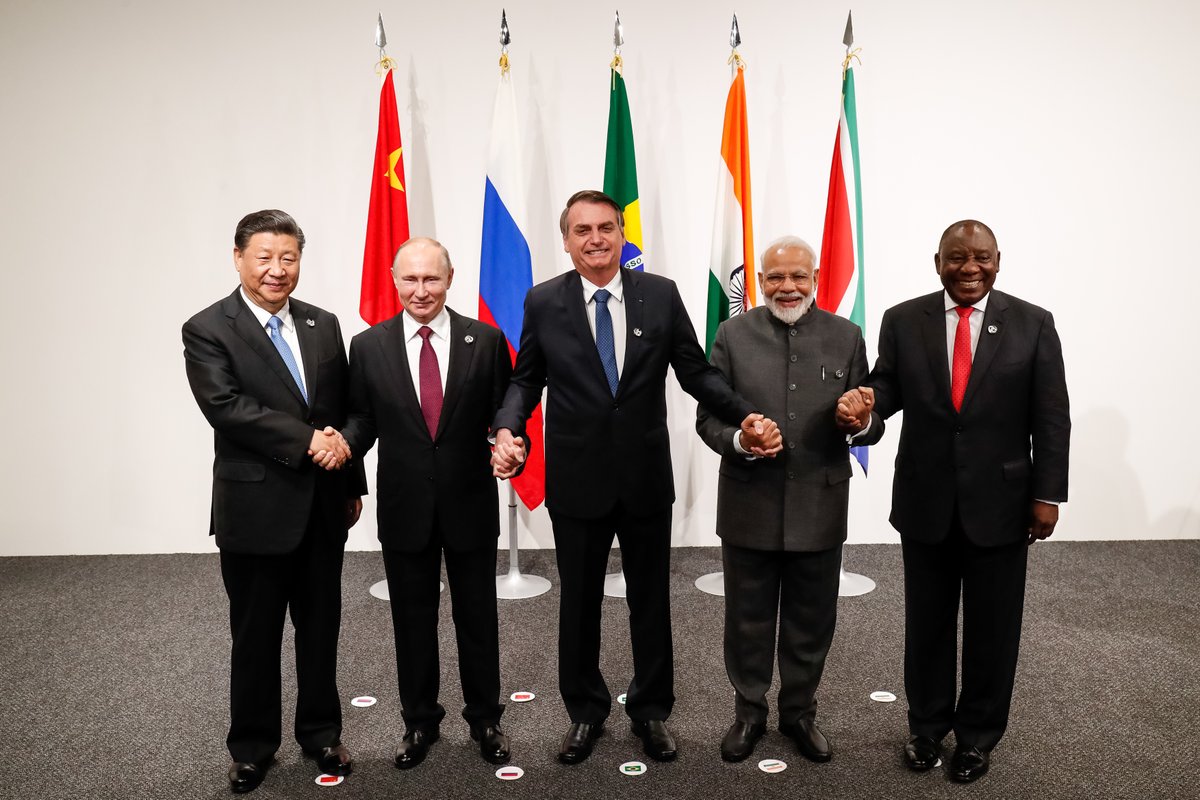A new era of global polarization...
From BRICS' new currency plans to trade in the Chinese Yuan... let’s take a look at recent events that have significantly propelled this trend.
A 🧵👇 (1/10)
From BRICS' new currency plans to trade in the Chinese Yuan... let’s take a look at recent events that have significantly propelled this trend.
A 🧵👇 (1/10)

2/10: The biggest recent catalyst are the sanctions imposed on Russia...
Sanctions have forced Moscow to look for other ways to get paid for their #oil, LNG, wheat, etc. This has led to more international trade using the Russian ruble, the Chinese yuan, and other currencies.
Sanctions have forced Moscow to look for other ways to get paid for their #oil, LNG, wheat, etc. This has led to more international trade using the Russian ruble, the Chinese yuan, and other currencies.
3/10: Russian parliamentarian Alexander Babakov, recently revealed that the BRICS countries are working on the development of a new form of currency.
The nations involved will pitch ideas related to the objective during its upcoming summit in South Africa in August.
The nations involved will pitch ideas related to the objective during its upcoming summit in South Africa in August.

4/10: The IMF has also acknowledged the US dollar's declining dominance in global central bank reserves.
Contributing factors include the diversification of central banks' holdings, the rise of alternative currencies, and even cryptocurrencies.
Contributing factors include the diversification of central banks' holdings, the rise of alternative currencies, and even cryptocurrencies.
5/10: Another recent event has been France deciding to settle some of its LNG trade with China in Chinese yuan.
This reflects the yuan's growing role in international trade and France's desire to strengthen economic ties with China.
This reflects the yuan's growing role in international trade and France's desire to strengthen economic ties with China.

6/10: Saudi Aramco also just signed 2 big refinery deals with Chinese companies.
During his visit to Saudi Arabia, Xi Jinping advocated for oil trade in yuan, which could undermine the US dollar's global trade dominance and its status as the world's reserve currency.
During his visit to Saudi Arabia, Xi Jinping advocated for oil trade in yuan, which could undermine the US dollar's global trade dominance and its status as the world's reserve currency.

7/10: In addition, China just brokered a historic truce between Saudi Arabia and Iran...
It seems as though China's growing influence in the Middle East has the potential to upend long-standing dynamics and power balances.
It seems as though China's growing influence in the Middle East has the potential to upend long-standing dynamics and power balances.

8/10: All of these recent geopolitical events are contributing to the formation of regional currencies and trading blocs...
This will likely lead to a more polarized world between East and West, where global economic cooperation may prove difficult.
This will likely lead to a more polarized world between East and West, where global economic cooperation may prove difficult.
9/10: The rise of regional blocs and the decline of US dollar hegemony likely lead to:
1. Geopolitical instability
2. Reduced US influence
3. Shifts in global trade patterns
4. Increased exchange rate volatility
5. Less global economic cooperation
Just to name a few...
1. Geopolitical instability
2. Reduced US influence
3. Shifts in global trade patterns
4. Increased exchange rate volatility
5. Less global economic cooperation
Just to name a few...

9.5/10: Sorry to interrupt, but...
If you want to stay updated with this type of content, check out The Real Vision Daily Briefing newsletter.
It's totally FREE 👇
rvtv.io/3GFuCBl
If you want to stay updated with this type of content, check out The Real Vision Daily Briefing newsletter.
It's totally FREE 👇
rvtv.io/3GFuCBl
10/10: The ongoing trend of de-dollarization represents a significant shift in the global economic landscape.
It could be beneficial to individual blocs, but it will likely harm most international relations and global trade. In other words, highly inflationary...
It could be beneficial to individual blocs, but it will likely harm most international relations and global trade. In other words, highly inflationary...
Is the US dollar’s dominance coming to an end?
• • •
Missing some Tweet in this thread? You can try to
force a refresh

 Read on Twitter
Read on Twitter








